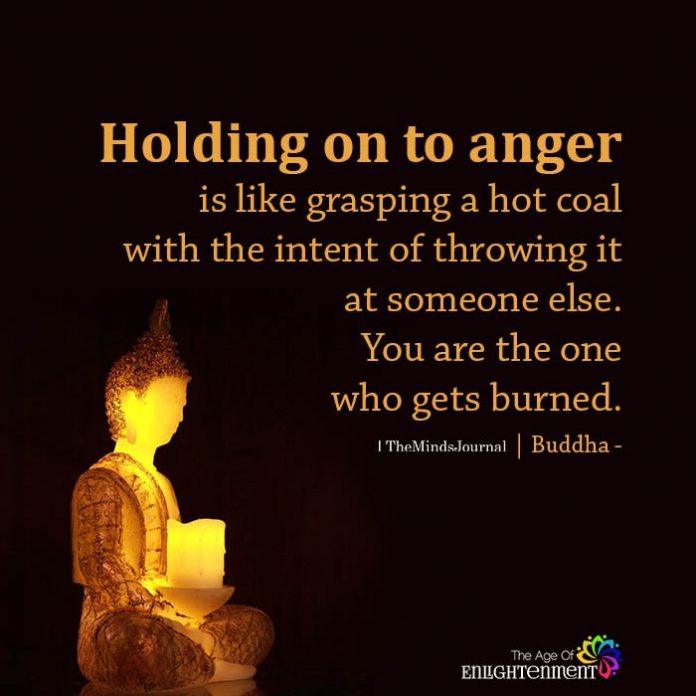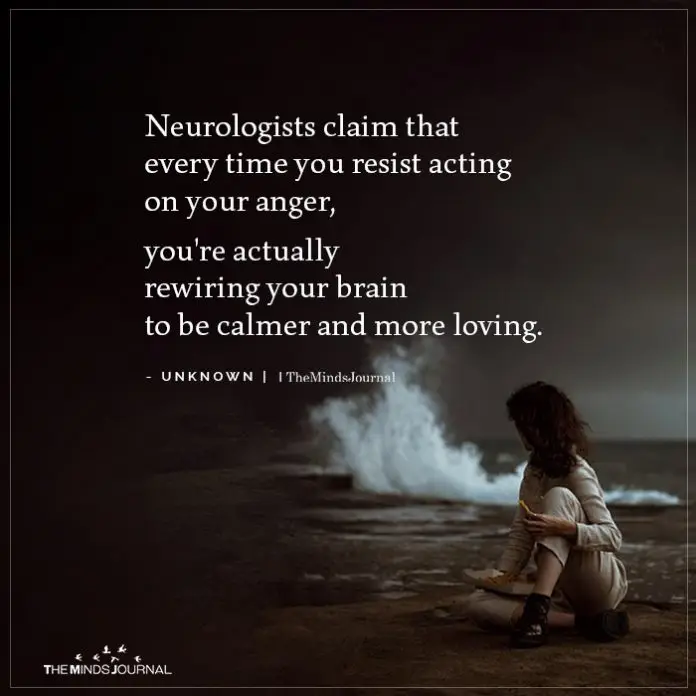Are you someone who struggles with their anger, because you are always made to feel that you should control your anger issues because it’s not “ideal”?
“Don’t try to hide inside anger, a radiance that cannot be hidden.” ~ Rumi (The Essential Rumi)
We’ve all at some time in our lives felt anger ignite within us with a fiery intensity. This feeling surges through our veins in an intoxicating way, yet we also know that it can get us into a lot of trouble.
When we were young, not much effort was put into teaching us how to express our feelings or learning how to relate with others on an empathetic level. Instead, we put great importance in learning algebra and history, but when it came to understanding our own inner emotions, we were left up to our own instincts to “figure it all out.”
With such a defective approach to emotion, it’s no wonder that we collectively perceive emotions such as anger in a negative light. In fact, anger is so feared that as a society we tend to hide it away or reserve it for “acceptable” places such as sports matches or music concerts.
But the greater our fear of facing or expressing anger is, the more we tend to repress it. And when anger is repressed, it tends to surface through other channels leading to problems such as passive aggression, indirect hostility, self-hatred, psychosomatic physical ailments, and even psychotic breakdowns.
What Really Is “Anger”?
There are two types of anger:
Anger that is channeled in a healthy way, and anger that is channeled in an unhealthy way. In other words, we can either mistreat anger or honor it for the messages it is bringing us at the moment.
Although we might fear or condemn anger, anger itself is not the issue. Anger is a life force within us, it is our volition manifesting itself in the rawest way it knows how. Anger is the only real energy that has been provoked. Only when we learn how to turn this energy into personal power can we mature as individuals.
When anger is channeled in unhealthy ways it becomes a corrosive emotion, tainting anything in its proximity. Unacknowledged anger can also lie at the root of Soul Loss. In other words, when anger is suppressed for too long, it can numb your insides so that you lose touch with your vital core essence. Eventually, through time, you grow unaware that the source of your never-ending unhappiness is your unexplored anger from ages past.

Unfortunately, in our society, it seems that anger is so feared, avoided, and repressed, that it often leads not only to soul loss but too violent acts of repression. Rage and crimes of passion are only really the result of a blocked inner volcano that has been buried beneath the ground, or conscious mind, too long.
Take a moment to consider how anger drives your behavior. Does it make you explode at your spouse or children? Does it compromise your closest friendships and relationships, or turn you into a person you hate? Perhaps your anger even fuels addictions or prejudice against others.
For others, anger is turned into the more acceptable form of workaholism. And for some, anger is taken out on fellow employees or pets. Anger can even be channeled in a passive-aggressive way by using silent treatment or offering insincere love in a relationship.
As a result of our mistreatment of anger, we understandably come to fear it. Consequently, many people out there feel that they should try to “get rid” of this emotion as soon as possible. But little do they know that this actually perpetuates the cycle of fear, avoidance, repression, and suffering.
But can you really escape your anger issues?
The truth is that you can’t escape what already IS. Any movement to escape anger or get rid of it is denying the flow of energy that is arising within you. It is through the resistance that you feed this energy.
So what is the alternative?
Related: The Surprising Way Anger Can Be Healthy and Make Your Relationships Better
Seeing Your Anger As A Messenger
The second type of anger is a healthily channeled form of anger.
Instead of being used to fuel aggression, hatred, and rage, healthily channeled anger serves to bring much insight, passion, and creativity into life.
On my own life path, I’ve come to see anger not as an issue, but as a messenger. Anger lets me know when something has caused friction within me. It lets me know that my ego has been hurt, or an old scar has been scratched. It is a valuable teacher. But you must use your intelligence to listen to it.
As someone who has struggled with a lot of anger in the past, I find that it helps to practice mindfulness when it comes to dealing with anger.
Whenever I feel anger arises, I choose to stop, notice it, and try to understand it. I search for the mental stories inside that feed this anger, and the strategies that the mind tries to use to escape it. Consciously asking the question, “What exactly just happened? Why am I angry?” has helped me to channel my anger in a healthy and productive way.
Anger can also be channeled through creative expression such as writing, painting, building, or otherwise creating. In fact, passion itself can be thought of as anger that has undergone a metamorphosis, being put to a higher purpose.
Problems arise when we feel anger, but let it seep into us without reflecting on it and taking action. When anger is not actively reflected on, it can build up into a pool of discontent that swells and stagnates with time. And when we fail to articulate our anger in some effective way, we often end up turning those feelings against ourselves. This can turn into self-hatred. My mother was one of these people. She turned her anger into deep self-loathing and drank her life away alternating it with the oblivion of drugs.
I don’t believe in dismissing, avoiding or ignoring any aspects that arise with us. There are no bad emotions, just a misuse or misunderstanding of them. All emotions can be valuable teachers, including anger.
Related: Anger Management: 4 Tips To Help You Manage Your Anger
How To Heal Your Anger Issues
The best way to heal any anger issues that you have is to change your perception of anger itself.
Living in a Latino family, I’ve learned enough about anger to understanding it well. Anger is vitality and liveliness in its purest form.
By repressing anger, we lose this vitality, this power of creation, and dull ourselves to one of our greatest strengths and allies.
Here are some other ways that anger helps us:
- Anger can be used to arouse and purge other emotions (like sadness) from our system.
- Anger can give you a voice when you felt you had none.
- Anger can force you to take charge of your life.
- Anger can become your fuel for endurance or strength to accomplish your goals.
- Anger can help you quit a job that is soul-sucking.
- Anger can inspire you to eat more ethically (vegetarianism and veganism).
- Anger can force you to get a divorce and improve your life (if you’re in an abusive marriage).
- There are so many possible ways anger can help us when channeled in a mindful and healthy way.
But anger can also be immature. For example, we might feel angry at other people for trying to “steal our freedom” or angry when things don’t go our way. In these circumstances, it always helps to stop, feel, and try to understand your anger. By opening yourself to it and understanding its root source, you will realize that your life and your happiness is your responsibility – no one else’s. This is what I call “mature anger.”
Mature anger is anger used wisely. For example, many sensitive souls out there feel rage and anguish at the state of our planet, and the suffering, extinction, and death of so many individuals, species, and cultures. When approached in an immature way, this anger can create depression, bitterness, and misanthropy. But when approached in a mature way, this anger can become a source of clarity and strength that motives constructive change and compassion for those who are suffering.
It is our responsibility as mature individuals to cooperate with anger.

Finally, many people believe anger is hatred, but it isn’t. Hatred comes from our mental attachment to anger. Spiritual leaders like the Dalai Lama and Thich Nhat Hanh have both have spoken about how condemning anger can be a form of oppression.
As Tibetan Buddhists put it, “anger straight from the heart of pure compassion!”
And as Thich Nhat Hanh writes:
“In the beginning, you may not understand the nature of your anger, or why it has come to be. But if you know how to embrace it with the energy of mindfulness, it will begin to become clear to you.”
“Our attitude is to take care of anger. We don’t suppress or hate it or run away from it. We just breathe gently and cradle our anger in our arms with the utmost tenderness.”
Releasing Anger
Anger arises from within our conscious awareness. When we choose to notice it, we can take a step back into conscious awareness, and away from being fixated in the feeling of anger itself. When we transform anger in this way, instead of avoiding it, anger becomes a beautiful divine quality: compassion for ourselves and others.
Anger is almost always a defense for more vulnerable feelings pain, hurt, and especially fear. But being insightful and mindful about anger can be extremely hard, especially when we seem to be bursting with it. This is why it’s important to do a release exercise.
There is a difference between venting anger and expressing it. To vent is simply to blow off steam, e.g. going to the gym, screaming, breaking things. This form of release can release some tension, but it is far from a complete response to the emotion. To express your anger, on the other hand, is to openly show your anger about a particular situation or condition, letting yourself and the other person know how you feel.
Expressing your anger can be done through self-awareness and using the questions above (“What exactly has happened? Why am I angry?“), while also exploring your contributing self-belief systems and existing core wounds. The release exercise below is about letting out any existing emotions already built up inside of you.
Venting helps us to lower the “voltage” of anger locked in our mind-bodies, creating enough space so that we can begin to see the patterns causing our problems. You can use the release exercises once a day for a week, and anytime you find yourself feeling especially stressed out, frustrated, disappointed, depressed, misunderstood, etc.
With practice, you’ll feel lighter, more authentic, more empowered, and less reactive to other people. Releasing is not the complete remedy, it will only allow you to see clearer and deeper into the dysfunctional patterns of your life.
Related: How You Can Manage Your Anger And Never Let It Control You
Release Method
Find a space where you won’t be disturbed for at least 10 minutes.
You’ll need to find something that you can strike without hurting yourself or damaging the object, e.g. your bed, or a couch, mattress, punching bag, etc. Using your fists, give yourself permission to pound this object for at least ten minutes.
If you can, try yelling into a pillow for a minute or so (making sure to muffle your sounds if in earshot to anyone else). Another method is lying on your back on a mattress and kicking your legs scissors style while pounding your fists at the same time. Using a stick or tennis racket is also effective.
It might help to remember the stories of injustice done to you. Or you might want to find a new reason for being angry, for channeling the rage you feel into a cause worthy of your emotion (notice that you are not trying to “get rid of” your anger here, but you’re instead giving your anger a purpose for existing).
In the beginning, you’ll feel silly and uncomfortable doing this. This is normal, and it is a result of the old conditioning we have of feeling shameful for expressing our passion, which certainly includes anger. After a few practices, you will feel more at ease doing this exercise.
Anger is often misunderstood, but it is Spirit thundering through us letting us know that something is in its way.
By owning the power of anger, and by letting it flow through us – from the tip of suffering in our awareness to the grounded compassion in our actions – can our anger be entirely expressed.
Written by Mateo Sol
Originally Appeared On lonerwolf.com
If you are someone who has always struggled with anger issues, then hopefully this release method will help you channel it in a much healthier manner. Remember to not be too hard on yourself, otherwise, it will just make things worse. Be patient and kind to yourself, and see how much that actually helps you.










Leave a Reply
You must be logged in to post a comment.